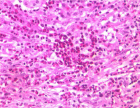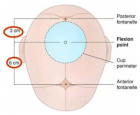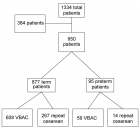Abstract
Mini Review
Current Practices for Severe Alpha-1 Antitrypsin Deficiency Associated COPD and Emphysema
MJ Nicholson* and M Seigo
Published: 26 July, 2024 | Volume 8 - Issue 2 | Pages: 044-047
Alpha-1 antitrypsin deficiency is a genetic disorder that can lead to chronic obstructive pulmonary disease and emphysema. Although it is the most well-studied genetic risk factor for emphysema, data is still scarce. Traditionally, medical therapy is similar to standard chronic obstructive pulmonary disease patients. Over the past several decades, enzyme augmentation therapy has emerged as a highly utilized alpha-1 antitrypsin-specific therapy. It has become the standard of care for severe alpha-1 antitrypsin deficiency despite unclear effects on a multitude of clinical outcomes. Significant data supports interventional therapies, including lung volume reduction surgery and bronchoscopic lung volume reduction, for chronic obstructive pulmonary disease patients without alpha-1 antitrypsin deficiency. These interventions have less robust data in the treatment of alpha-1 antitrypsin-induced chronic obstructive pulmonary disease. This review will explore the data regarding various treatment options for severe alpha-1 antitrypsin deficiency associated with chronic obstructive pulmonary disease and emphysema.
Read Full Article HTML DOI: 10.29328/journal.jprr.1001058 Cite this Article Read Full Article PDF
References
- Strnad P, McElvaney NG, Lomas DA. Alpha1-Antitrypsin Deficiency. N Engl J Med. 2020;382(15):1443-1455. Available from: https://doi.org/10.1056/nejmra1910234
- Stoller JK, Aboussouan LS. Α1-antitrypsin deficiency. Lancet. 2005;365(9478):2225-2236. Available from: https://doi.org/10.1016/s0140-6736(05)66781-5
- Ogushi FG, Fells GA, Hubbard RC, Straus SD, Crystal RG. Z-type alpha 1-antitrypsin is less competent than M1-type alpha 1-antitrypsin as an inhibitor of neutrophil elastase. J Clin Invest. 1987;80(5):1366-1374. Available from: https://doi.org/10.1172/JCI113214
- Lieberman J, Winter B, Sastre A. Alpha1-antitrypsin Pi-types in 965 COPD patients. Chest. 1986;89(3):370-373. Available from: https://doi.org/10.1378/chest.89.3.370
- Stoller JK. Detecting alpha-1 antitrypsin deficiency. Ann Am Thorac Soc. 2016;13(Suppl 4). Available from: https://doi.org/10.1513/AnnalsATS.201506-349KV
- Campos MA, Wanner A, Zhang G, Sandhaus RA. Trends in the diagnosis of symptomatic patients with α1-antitrypsin deficiency between 1968 and 2003. Chest. 2005;128(3):1179-1186. Available from: https://doi.org/10.1378/chest.128.3.1179
- Greulich T, Ottaviani S, Bals R, Lepper PM, Vogelmeier C, Luisetti M, et al. α1-Antitrypsin deficiency—diagnostic testing and disease awareness in Germany and Italy. Respir Med. 2013;107(10):1400-1408. Available from: https://doi.org/10.1016/j.rmed.2013.04.023
- Stoller JK, Sandhaus RA, Turino G, Dickson R, Rodgers K, et al. Delay in diagnosis of alpha-1 antitrypsin deficiency: a continuing problem. Chest. 2005;128(4):1989-1994. Available from: https://doi.org/10.1378/chest.128.4.1989
- Tejwani V, Nowacki AS, Fye E, Sanders C, Stoller JK. The impact of delayed diagnosis of alpha-1 antitrypsin deficiency: the association between diagnostic delay and worsened clinical status. Respir Care. 2019;64(7):915-922. Available from: https://doi.org/10.4187/respcare.06555
- World Health Organization. Alpha-1 antitrypsin deficiency: memorandum from a WHO meeting. Bull World Health Organ. 1997;75(5):397-415. Available from: https://www.proquest.com/openview/cbc69103dbd276091b9d33887c12ff6d/1?pq-origsite=gscholar&cbl=38034
- Parr DG, Stoel BC, Stolk J, Stockley RA. Pattern of emphysema distribution in alpha1-antitrypsin deficiency influences lung function impairment. Am J Respir Crit Care Med. 2004;170(9):1172-1178. Available from: https://doi.org/10.1164/rccm.200406-761OC
- McElvaney NG. Diagnosing α1-antitrypsin deficiency: How to improve the current algorithm. Eur Respir Rev. 2015;24(135):52-57. Available from: https://doi.org/10.1183/09059180.10010814
- American Thoracic Society; European Respiratory Society. American Thoracic Society/European Respiratory Society statement: standards for the diagnosis and management of individuals with alpha-1 antitrypsin deficiency. Am J Respir Crit Care Med. 2003;168(7):818-900. Available from: https://doi.org/10.1164/rccm.168.7.818
- Anthonisen NR, Connett JE, Kiley JP, Altose MD, Bailey WC, Buist AS, et al. Effects of smoking intervention and the use of an inhaled anticholinergic bronchodilator on the rate of decline of FEV1. The Lung Health Study. JAMA. 1994;272(19):1497-1505. Available from: https://pubmed.ncbi.nlm.nih.gov/7966841/
- Miravitlles M, Dirksen A, Ferrarotti I, Koblizek V, Lange P, Mahadeva R, et al. European Respiratory Society statement: diagnosis and treatment of pulmonary disease in α1-antitrypsin deficiency. Eur Respir J. 2017;50(5):1700610. Available from: https://doi.org/10.1183/13993003.00610-2017
- Hosenpud JD, Novick RJ, Breen TJ, Keck B, Daily P. The Registry of the International Society for Heart and Lung Transplantation: twelfth official report--1995. J Heart Lung Transplant. 1995;14(5):805-815. Available from: https://pubmed.ncbi.nlm.nih.gov/8800714/
- Levine SM, Anzueto A, Peters JI, Cronin T, Sako EY, Jenkinson SG, et alL. Medium term functional results of single-lung transplantation for end stage obstructive lung disease. Am J Respir Crit Care Med 1994;150:398–402. Available from: https://doi.org/10.1164/ajrccm.150.2.8049821
- Trulock E. Lung transplantation for alpha-1 antitrypsin deficiency emphysema. Chest 1996;110:248–294. Available from: https://doi.org/10.1378/chest.110.6_supplement.284s
- Tanash HA, Riise GC, Hansson L, Nilsson PM, Piitulainen E. Survival benefit of lung transplantation in individuals with severe α1-anti-trypsin deficiency (PiZZ) and emphysema. J Heart Lung Transplant. 2011;30(12):1342-7. Available from: https://doi.org/10.1016/j.healun.2011.07.003
- Stone HM, Edgar RG, Thompson RD, Stockley RA. Lung Transplantation in Alpha-1-Antitrypsin Deficiency. COPD. 2016;13(2):146-52. Available from: https://doi.org/10.3109/15412555.2015.1048850
- Morer L, Choudat L, Dauriat G, Durand F, Cazals-Hatem D, Thabut G, et al. Liver Involvement in Patients With Pi ZZ‐Emphysema, Candidates for Lung Transplantation. Am J Transplant. 2017;17(5):1389-1395. Available from: https://doi.org/10.1111/ajt.14152
- Smith DJ, Ellis PR, Turner AM. Exacerbations of lung disease in alpha-1 antitrypsin deficiency. Chron Obstruct Pulmon Dis. 2021;8(1):162-176. Available from: https://doi.org/10.15326/jcopdf.2020.0173
- Modrykamien A, Stoller JK. Alpha-1 antitrypsin (AAT) deficiency - what are the treatment options?. Expert Opin Pharmacother. 2009;10(16):2653-2661. Available from: https://doi.org/10.1517/14656560903300111
- Chapman KR, Burdon JG, Piitulainen E, Sandhaus RA, Seersholm N, Stocks JM, et al.; RAPID Trial Study Group. Intravenous augmentation treatment and lung density in severe α1 antitrypsin deficiency (RAPID): a randomised, double-blind, placebo-controlled trial. Lancet. 2015;386(9991):360-368. Available from: https://doi.org/10.1016/s0140-6736(15)60860-1
- McElvaney NG, Burdon J, Holmes M, Glanville A, Wark PA, Thompson PJ, et al.; RAPID Extension Trial Group. Long-term efficacy and safety of α1 proteinase inhibitor treatment for emphysema caused by severe α1 antitrypsin deficiency: an open-label extension trial (RAPID-OLE). Lancet Respir Med. 2017;5(1):51-60. Available from: https://doi.org/10.1016/s2213-2600(16)30430-1
- Dowson LJ, Guest PJ, Hill SL, Holder RL, Stockley RA. High-resolution computed tomography scanning in alpha1-antitrypsin deficiency: relationship to lung function and health status. Eur Respir J. 2001;17(6):1097-1104. Available from: https://doi.org/10.1183/09031936.01.00056501
- Miravitlles M, Anzueto A, Barrecheguren M. Nine controversial questions about augmentation therapy for alpha-1 antitrypsin deficiency: A viewpoint. Eur Respir Rev. 2023;32(170):230170. Available from: https://doi.org/10.1183/16000617.0170-2023
- Gelb AF, McKenna RJ, Brenner M, Fischel R, Zamel N. Lung function after bilateral lower lobe lung volume reduction surgery for alpha1-antitrypsin emphysema. Eur Respir J. 1999;14(4):928-933. Available from: https://erj.ersjournals.com/content/14/4/928.short
- Tutic M, Bloch KE, Lardinois D, Brack T, Russi EW, Weder W. Long-term results after lung volume reduction surgery in patients with alpha1-antitrypsin deficiency. J Thorac Cardiovasc Surg. 2004;128(3):408-413. Available from: https://doi.org/10.1016/j.jtcvs.2004.03.040
- Fishman A, Martinez F, Naunheim K, Piantadosi S, Wise R, Ries A, et al. A randomized trial comparing lung-volume-reduction surgery with medical therapy for severe emphysema. N Engl J Med. 2003;348(21):2059-2073. Available from: https://doi.org/10.1056/nejmoa030287
- Stoller JK, Gildea TR, Ries AL, Meli YM, Karafa MT; National Emphysema Treatment Trial Research Group. Lung volume reduction surgery in patients with emphysema and alpha-1 antitrypsin deficiency. Ann Thorac Surg. 2007 Jan;83(1):241-251. Available from: https://doi.org/10.1016/j.athoracsur.2006.07.080
- Rathinam S, Davies RJO, Ali J, Phillips J, Leonard C, McStay R, et al. The role of the emphysema multidisciplinary team in a successful lung volume reduction surgery programme. Eur J Cardiothorac Surg. 2014;46(6):1021-1026; discussion 1026. Available from: https://doi.org/10.1093/ejcts/ezu129
- Clark SJ, Oey I, Steiner M, Spyt T, Morgan MD, Waller DA. Surgical approaches for lung volume reduction in emphysema. Clin Med (Lond). 2014;14(2):122-127. Available from: https://doi.org/10.7861/clinmedicine.14-2-122
- Sandhaus RA, Turino G, Brantly ML, Campos M, Cross CE, Goodman K, et al. The diagnosis and management of alpha-1 antitrypsin deficiency in the adult. Chronic Obstr Pulm Dis. 2016;3(3):668-682. Available from: https://doi.org/10.15326/jcopdf.3.3.2015.0182
- Criner GJ, Sue R, Wright S, Dransfield M, Rivas-Perez H, Wiese T, et al. A Multicenter Randomized Controlled Trial of Zephyr Endobronchial Valve Treatment in Heterogeneous Emphysema (LIBERATE). Am J Respir Crit Care Med. 2018;198(9):1151-1164. Available from: https://doi.org/10.1164/rccm.201803-0549OC
- Criner GJ, Delage A, Voelker K, Hogarth DK, Majid A, Zgoda M, et al. Improving Lung Function in Severe Heterogenous Emphysema with the Spiration Valve System (EMPROVE). Am J Respir Crit Care Med. 2019;200(11):1354-1362. Available from: https://doi.org/10.1164/rccm.201902-0383OC
- Hartman JE, Welling JBA, Klooster K, Carpaij OASW, Augustijn SWS, Slebos DJ, et al. Survival in COPD patients treated with bronchoscopic lung volume reduction. Respir Med. 2022;196:106825. Available from: https://doi.org/10.1016/j.rmed.2022.106825
- Everaerts S, Hartman JE, Van Dijk M, Koster TD, Slebos DJ, Klooster K, et al. Bronchoscopic Lung Volume Reduction in Patients with Emphysema due to Alpha-1 Antitrypsin Deficiency. Respiration. 2023;102(2):134-142. Available from: https://doi.org/10.1159/000528182
- Hogarth DK, Delage A, Zgoda MA, Nsiah-Dosu S, Himes D, Reed MF. Efficacy and safety of the Spiration Valve System™ for the treatment of severe emphysema in patients with alpha-1 antitrypsin deficiency (EMPROVE). Respir Med. 2024;224:107565. Available from: https://doi.org/10.1016/j.rmed.2024.107565
Figures:
Similar Articles
-
Avoiding confusion in high flow oxygen therapy conceptsGarcía G,Valencia P,Mercedes E, Sarhane Y,Díaz-Lobato S*,Agosta M. Avoiding confusion in high flow oxygen therapy concepts. . 2017 doi: 10.29328/journal.jprr.1001001; 1: 001-002
-
Acute and chronic changes in massive Barium Sulfate aspiration in an infant who subsequently was diagnosed with severe Gastro-esophageal RefluxSevgi Pekcan*. Acute and chronic changes in massive Barium Sulfate aspiration in an infant who subsequently was diagnosed with severe Gastro-esophageal Reflux . . 2017 doi: 10.29328/journal.jprr.1001002; 1: 003-008
-
Successful Therapy with intravenous gamma globulin in two children with postinfectious bronchiolitis obliteransSevgi Pekcan,Bahar Gökturk*, Ismail Reisli. Successful Therapy with intravenous gamma globulin in two children with postinfectious bronchiolitis obliterans. . 2017 doi: 10.29328/journal.jprr.1001003; 1: 009-012
-
Fluticasone furoate/Vilanterol 92/22 μg once-a-day vs Beclomethasone dipropionate/Formoterol 100/6 μg b.i.d. in asthma patients: a 12-week pilot studyClaudio Terzano*,Francesca Oriolo. Fluticasone furoate/Vilanterol 92/22 μg once-a-day vs Beclomethasone dipropionate/Formoterol 100/6 μg b.i.d. in asthma patients: a 12-week pilot study . . 2017 doi: 10.29328/journal.jprr.1001004; 1: 013-022
-
A decade of targeted therapy for non-small cell lung cancerKhalid Abu Ajaj*. A decade of targeted therapy for non-small cell lung cancer. . 2017 doi: 10.29328/journal.jprr.1001005; 1: 023-027
-
Successful treatment of late-onset pulmonary hypertension after atrial septal defect operation with macitentan: Our center experienceTarik Kivrak*,Zeynep Ulutas,Sena Sert, Bulent Mutlu. Successful treatment of late-onset pulmonary hypertension after atrial septal defect operation with macitentan: Our center experience . . 2018 doi: 10.29328/journal.jprr.1001006; 2: 001-003
-
Effect of diabetes mellitus on the Pulmonary Function Tests in Sudanese Diabetic PatientsElmutaz H Taha,Ibrahim A Ali*,Omer A Musa. Effect of diabetes mellitus on the Pulmonary Function Tests in Sudanese Diabetic Patients . . 2018 doi: 10.29328/journal.jprr.1001007; 2: 004-010
-
COPD and low plasma vitamin D levels: Correlation or causality?Luca Gallelli*, Erika Cione,Stefania Zampogna, Gino Scalone. COPD and low plasma vitamin D levels: Correlation or causality? . . 2018 doi: 10.29328/journal.jprr.1001008; 2: 011-012
-
Peculiarities of photon emisson of whole non-diluted human blood obtained from healthy donors and patients with some diseasesKirill N Novikov*,Vladimir L Voeikov,Ekaterina V Buravleva,Nadezhda G Berdnikova. Peculiarities of photon emisson of whole non-diluted human blood obtained from healthy donors and patients with some diseases . . 2018 doi: 10.29328/journal.jprr.1001009; 2: 013-019
-
Stethoscope - Over 200 yearsHenrik Permin*,Svend Norn . Stethoscope - Over 200 years . . 2019 doi: 10.29328/journal.jprr.1001010; 3: 001-008
Recently Viewed
-
Do Fishes Hallucinate Human Folks?Dinesh R*,Sherry Abraham,Kathiresan K,Susitharan V,Jeyapavithran C,Paul Nathaniel T,Siva Ganesh P. Do Fishes Hallucinate Human Folks?. Arch Food Nutr Sci. 2017: doi: 10.29328/journal.afns.1001003; 1: 020-023
-
Assessment of Redox Patterns at the Transcriptional and Systemic Levels in Newly Diagnosed Acute LeukemiaAna Carolina Agüero Aguilera, María Eugenia Mónaco, Sandra Lazarte, Emilse Ledesma Achem, Natalia Sofía Álvarez Asensio, Magdalena María Terán, Blanca Alicia Issé, Marcela Medina, Cecilia Haro*. Assessment of Redox Patterns at the Transcriptional and Systemic Levels in Newly Diagnosed Acute Leukemia. J Hematol Clin Res. 2024: doi: 10.29328/journal.jhcr.1001029; 8: 017-023
-
Assessment of Indigenous Knowledge on Using of Traditional Medicinal Plants to Cure Human Diseases in South Omo Zone Baka Dawla Ari District, Kure and Bitsmal South EthiopiaGizaw Bejigo*. Assessment of Indigenous Knowledge on Using of Traditional Medicinal Plants to Cure Human Diseases in South Omo Zone Baka Dawla Ari District, Kure and Bitsmal South Ethiopia. J Plant Sci Phytopathol. 2024: doi: 10.29328/journal.jpsp.1001132; 8: 048-054
-
Nanoencapsulated Extracts from Leaves of Bauhinia forficata Link: In vitro Antioxidant, Toxicogenetic, and Hypoglycemic Activity Effects in Streptozotocin-induced Diabetic MiceBárbara Verônica Cardoso de Souza, Alessandra Braga Ribeiro*, Rita de Cássia Meneses Oliveira, Julianne Viana Freire Portela, Ana Amélia de Carvalho Melo Cavalcante, Esmeralda Maria Lustosa Barros, Luís Felipe Lima Matos, Tarsia Giabardo Alves, Maria. Nanoencapsulated Extracts from Leaves of Bauhinia forficata Link: In vitro Antioxidant, Toxicogenetic, and Hypoglycemic Activity Effects in Streptozotocin-induced Diabetic Mice. Arch Pharm Pharma Sci. 2024: doi: 10.29328/journal.apps.1001063; 8: 100-115
-
GELS as Pharmaceutical Form in Hospital Galenic Practice: Chemico-physical and Pharmaceutical AspectsLuisetto M*,Edbey Kaled,Mashori GR,Ferraiuolo A,Fiazza C,Cabianca L,Latyschev OY. GELS as Pharmaceutical Form in Hospital Galenic Practice: Chemico-physical and Pharmaceutical Aspects. Arch Surg Clin Res. 2025: doi: 10.29328/journal.ascr.1001084; 9: 001-007
Most Viewed
-
Evaluation of Biostimulants Based on Recovered Protein Hydrolysates from Animal By-products as Plant Growth EnhancersH Pérez-Aguilar*, M Lacruz-Asaro, F Arán-Ais. Evaluation of Biostimulants Based on Recovered Protein Hydrolysates from Animal By-products as Plant Growth Enhancers. J Plant Sci Phytopathol. 2023 doi: 10.29328/journal.jpsp.1001104; 7: 042-047
-
Sinonasal Myxoma Extending into the Orbit in a 4-Year Old: A Case PresentationJulian A Purrinos*, Ramzi Younis. Sinonasal Myxoma Extending into the Orbit in a 4-Year Old: A Case Presentation. Arch Case Rep. 2024 doi: 10.29328/journal.acr.1001099; 8: 075-077
-
Feasibility study of magnetic sensing for detecting single-neuron action potentialsDenis Tonini,Kai Wu,Renata Saha,Jian-Ping Wang*. Feasibility study of magnetic sensing for detecting single-neuron action potentials. Ann Biomed Sci Eng. 2022 doi: 10.29328/journal.abse.1001018; 6: 019-029
-
Pediatric Dysgerminoma: Unveiling a Rare Ovarian TumorFaten Limaiem*, Khalil Saffar, Ahmed Halouani. Pediatric Dysgerminoma: Unveiling a Rare Ovarian Tumor. Arch Case Rep. 2024 doi: 10.29328/journal.acr.1001087; 8: 010-013
-
Physical activity can change the physiological and psychological circumstances during COVID-19 pandemic: A narrative reviewKhashayar Maroufi*. Physical activity can change the physiological and psychological circumstances during COVID-19 pandemic: A narrative review. J Sports Med Ther. 2021 doi: 10.29328/journal.jsmt.1001051; 6: 001-007

HSPI: We're glad you're here. Please click "create a new Query" if you are a new visitor to our website and need further information from us.
If you are already a member of our network and need to keep track of any developments regarding a question you have already submitted, click "take me to my Query."


















































































































































